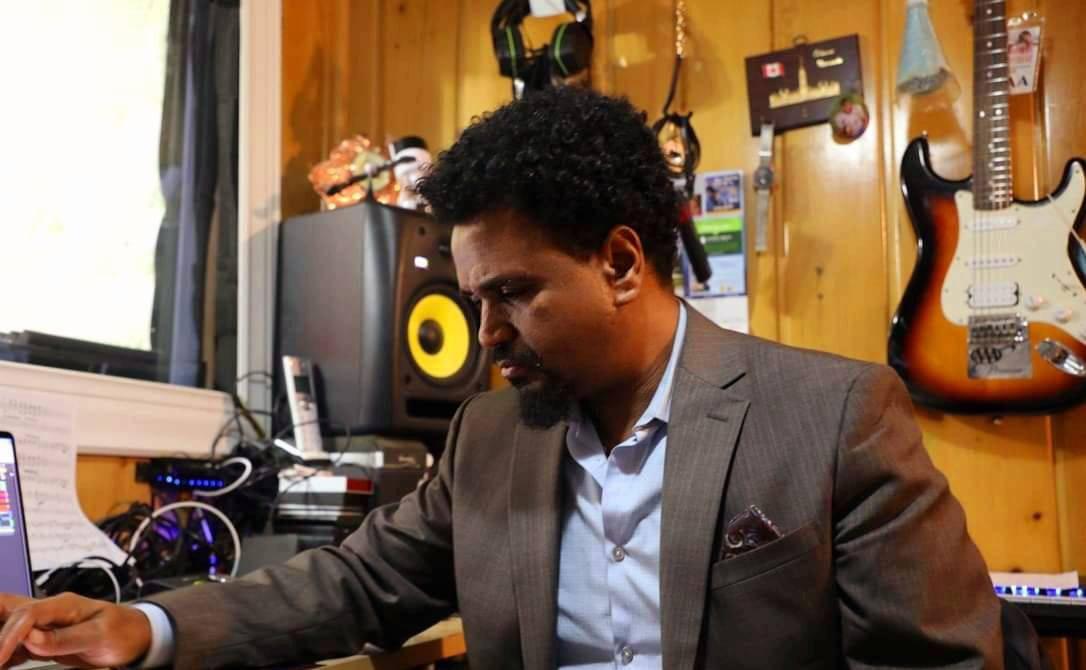
Africa-Press – Eritrea. Our guest today is Awet Okbay: a composer, producer, multi-instrumentalist, and full-time musician. He currently resides in Minnesota, USA. On his latest visit to Eritrea, this interview took place a few weeks ago.
I started leaning towards music at an early age. I was a member of the Qeyahti Embaba and grew up in Kessela, Sudan. The school curriculum encompassed various activities: sports, literature, music, painting, performances, and history. There was a place for everyone. I participated in the cultural club and used to sing at different events. Then, I developed a fondness for the bass guitar and began to learn the guitar. I even started to play with some of the Sudanese boys my age. But this was done informally. And it wasn’t until a few years later, when some music teachers went abroad to pursue an education in music, that I realized music was an entire field of learning that one could study exclusively. I moved to Sweden at the end of 1996.
Well, at that time, music was considered something of a pastime and one was usually dissuaded from pursuing a career in the arts. My family feared it would deter me from my academic studies, but by then it was too late. I was a lover of music.
I was helped, I believe, as many of my contemporaries were, by the cultural troupes of the EPLF who when they came to perform for us, always represented the heritage and ethnicities of all Eritreans. This prevented me from veering away from my cultural roots even when I was exposed to and influenced by all kinds of foreign music in the following years. And the great musicians from the EPLF served as our role models. We all looked up to them and wanted to be like them. Many of us grew to become professional artists – one of my schoolmates was the renowned Helen Meles.
Yes, I began working in studios with professional musicians. I continued to perform with different bands (some of them reggae bands from Trinidad and Jamaica) and Eritrean bands for other celebrations, national events, and holidays. In 2001, I moved to the US and enrolled in college to study music. Until then, my instruction had been informal and primarily from one-on-one tutors. So, I did struggle at first, especially on the theoretical aspects, and worked hard to catch up. But the practical experience of working as a musician had sharpened my ears.
Currently, I have a band. We play jazz and funk mostly. I also have a studio, and I compose and produce different kinds of music. I have a YouTube channel where I recently released a music video in collaboration with the EriAm Sisters.
The song is titled We’re Gonna Make It. It was during the COVID pandemic lockdown. We decided to work on something to help us raise funds to support the Eritrean people. The collaboration was virtual. The opportunity to work with other Eritrean artists was aided by our new association, Artists for Eritrea.
No, it’s pretty easy, actually. Technology today is so advanced that the range of what you can do depends almost entirely on you. And the artists I worked with are all highly professional.
There are a lot of young and talented Eritreans who were born and raised abroad and who are always eager to create something that honors and resonates with their culture and people. The idea began as a way to connect these artists and create a network worldwide. We wanted a platform where they could all unite through art, so the NGO ArtistsforEritrea. org was created. The platform encompasses all the arts: music, painting, literature, poetry, and performance arts.
Yes. I think collaborating with other artists enhances your art, enriches your experience, and humbles you. So far, I’ve worked with many renowned Eritrean musicians. I’ve also produced and composed for a diverse collection of artists from Liberia, Somalia, Cuba, Sudan, Nigeria, and the US, to name a few.
In Sweden, I used to frequent clubs and piano bars to observe and learn from the performers there. Once I met a professional Jazz and Blues singer, pianist, and composer who had heard us perform a traditional song. He asked me to teach him about Eritrean music. Just imagine this world-class musician asking me to teach him! I showed him the basics of Tigrigna songs, and he gave me music lessons.
The other time was while I was recording in a studio where an American singer heard the song I was composing. She asked me what culture it was from, and I explained to her that it was Tigrigna, one of the nine languages of Eritrea. Before that time, she’d never even heard of Eritrea but was so enamored with the style that she came in the following day (she’d spent the night reading about Eritrea) and asked us to compose a song for her. So we wrote a music titled Women of the Nile, whose style is a fusion of Tigrigna and English genres. At the end of the day, remaining true to the authenticity and originality of your culture is what sets you apart in the art world.
I love jazz. Generally, though, a musician should be exposed to as many genres as possible before settling on one.
My plan at the moment is to continue to develop and expand Artists for Eritrean and to create opportunities for collaboration with Eritrean artists based in Eritrea. Because if I’ve learned anything during my visit, it’s that there are many promising, talented young artists here.
Source: Eritrea Ministry Of Information
For More News And Analysis About Eritrea Follow Africa-Press






